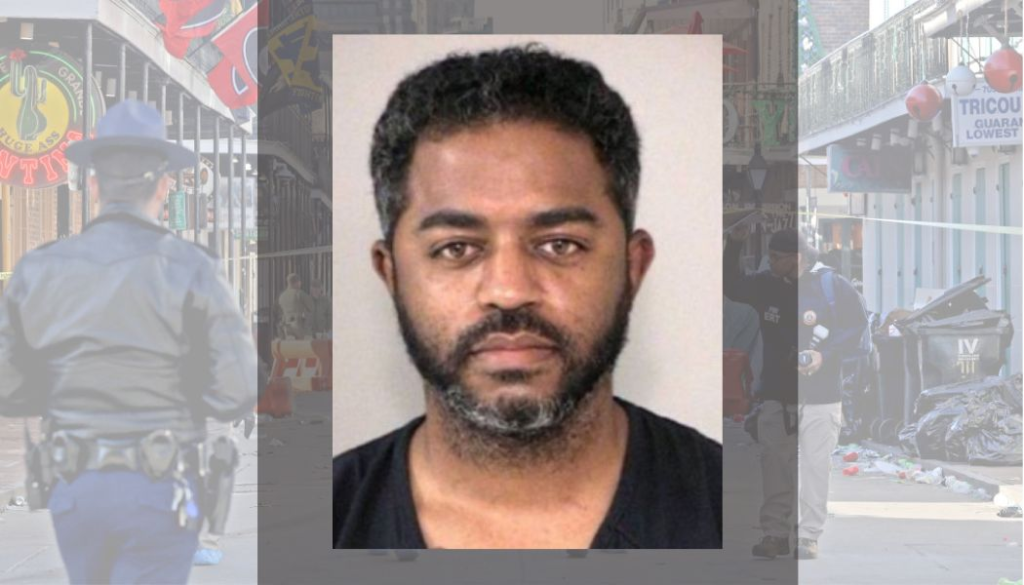On New Year’s Day, tragedy struck New Orleans when Shamsud-Din Jabbar, a 42-year-old man, carried out a horrifying act of violence on Bourbon Street. Driving a rented truck into a crowded area, Jabbar killed fourteen people and injured dozens more.
Shamsud-Din Jabbar was killed in a shootout with police shortly after the attack. US federal investigators have classified this as an act of terrorism, linking Jabbar to ISIS, a group to which he pledged allegiance. Following the attack, an FBI investigation into Jabbar’s life and residence uncovered unsettling details that offer a glimpse into his radicalization and preparation for the heinous act.
A Life in Chaos: Inside Jabbar’s Residence
The FBI raided Shamsud-Din Jabbar’s trailer home in North Houston after the attack. What they found painted a stark picture of a man living in disorder, both physically and mentally. The residence was in utter disarray, with the front door kicked in, cabinets open, and furniture overturned. In the midst of this chaos lay items that suggested an intent to cause harm.
A workbench equipped for assembling explosives was discovered in the bedroom, surrounded by clothes and other scattered belongings. Chemical residues and bottles containing substances commonly used in bomb-making were strewn about the property, indicating Jabbar’s preparations for creating dangerous devices.
Read : Vehicle Drove Into a Crowd in Bourbon Street of New Orleans: 10 Killed
Amid these findings, a rolled-up prayer rug and numerous Islamic texts were present, suggesting Jabbar’s connection to his faith, albeit one marred by extremist ideology. Investigators noted the juxtaposition of religious items with materials meant for destruction, reflecting the complex and troubling nature of his radicalization.
The Open Quran and Its Implications
One of the most notable discoveries in Jabbar’s home was a Quran opened to Verse 9:111, a passage often misused by extremist groups to justify acts of violence.
This verse reads: “They fight in Allah’s cause, and slay and are slain; a promise binding.” The specific emphasis on this passage points to its role in Jabbar’s distorted interpretation of his faith, influenced by extremist propaganda.
Before carrying out the attack, Jabbar posted chilling videos online. In these videos, he declared his allegiance to ISIS and referenced the same Quranic passage, issuing threats to various groups, including his own family.
Read : Israelis Sue UN Agency for $1 Billion Over Aiding, Abetting October 7 Hamas Attack
These recordings served as a stark testament to how Jabbar’s beliefs were manipulated to justify violence, blending his personal struggles with a broader ideological mission.

Jabbar’s younger brother, Abdur Jabbar, expressed shock at the turn of events, describing Shamsud-Din as a caring and intelligent individual before his radicalization.
He highlighted the difference between true religious values and the twisted narrative adopted by his brother, emphasizing that the tragedy was a result of extremist indoctrination rather than religion itself.
A Veteran’s Descent Into Extremism
Shamsud-Din Jabbar’s background adds another layer of complexity to his story. Once an Army staff sergeant, Jabbar served his country for ten years, including deployments to Afghanistan from 2009 to 2019. He left active duty in 2015 and transitioned to the reserves until 2020. During his military service, Jabbar was reportedly a disciplined and dedicated soldier.
However, post-military life brought challenges. Jabbar struggled to find stability in the real estate and IT sectors, facing financial difficulties and professional setbacks.
These struggles likely contributed to his vulnerability to radicalization. It is not uncommon for individuals facing personal crises to become susceptible to extremist ideologies, particularly when they offer a sense of purpose or belonging.
The investigation into Jabbar’s life underscores the importance of addressing the psychological and social challenges faced by veterans.

While his military background did not directly lead to his radicalization, it highlights the need for stronger support systems to help veterans transition to civilian life and prevent them from falling prey to harmful ideologies.
The Aftermath and Broader Implications
The New Orleans attack has left a deep scar on the community, with families mourning the loss of loved ones and survivors grappling with physical and emotional trauma.
The incident also raises pressing questions about the effectiveness of counter-terrorism efforts and the challenges of identifying individuals at risk of radicalization.
The findings in Jabbar’s home, including the bomb-making materials and the open Quran, reveal the interplay between personal struggles and ideological indoctrination in fostering extremist behavior.
It also underscores the need for vigilance in addressing the spread of radical propaganda, particularly online, where individuals like Jabbar often find reinforcement for their beliefs.
This tragedy serves as a grim reminder of the impact of radicalization and the importance of fostering resilience in communities to counter extremist influences.
For Jabbar’s family, the attack is a painful chapter that contrasts sharply with their memories of him as a kind and intelligent individual. His brother’s statement highlights the devastating impact of radical ideologies, not just on victims but also on the perpetrator’s loved ones.

